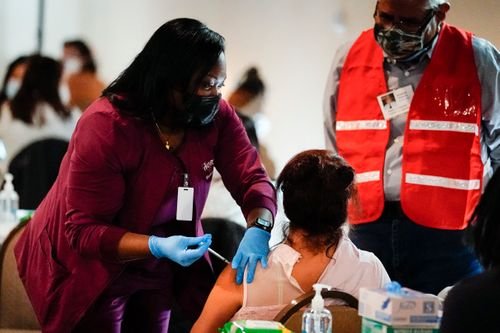Just 2 states haven’t shared when they plan to start vaccinating everyone 16 and older

Only two states — Arkansas and New York — have yet to announce when they’ll open Covid-19 vaccine eligibility to anyone 16 and older, with the rest saying they’ll have done it no later than May 1, according to a CNN analysis.
This comes as the pace of vaccinations has quickened. Yet with daily new coronavirus cases and deaths plateauing or even ticking up, “this is not the time to let down our guard,” White House’s Covid-19 response coordinator Jeff Zients said.
“You need to follow the public health guidance: Wear a mask, socially distance and get a vaccine when it’s your turn,” Zients said in news briefing Friday.
Six states already expanded vaccine eligibility to everyone 16 and over: Alaska, Mississippi, West Virginia, Utah, Georgia and Arizona.
Six more will join them Monday: Oklahoma, Texas, Ohio, North Dakota, Louisiana and Kansas. Minnesota joins Tuesday, followed by Indiana and South Carolina on Wednesday.
Every other state, except for Arkansas and New York, has said they plan to expand eligibility to 16 and older at least by May 1.
Though no such plan has been announced in Arkansas, “we do anticipate meeting the May 1 benchmark,” state health department spokeswoman Meg Mirivel wrote to CNN Friday.
In New York, Gov. Andrew Cuomo said Wednesday that he’s waiting to confirm how many doses of vaccine will be allocated before setting a date to expand eligibility.
The US averaged 2.67 million Covid-19 vaccine doses administered a day over the last week as of Saturday– the highest average recorded, according to CDC data.
More than 50 million people in the US — or about 15.1% of the population — have been fully vaccinated, according to CDC data available Saturday. About 91.7 million people, or 27.6% of the population, have received at least one dose, according to the CDC.
‘Deeply concerned about this trajectory’
Still, the country’s tallies of new Covid-19 cases and deaths have started to creep up in the last few days, though they still are well below their peaks in January.
The United States has averaged more than 61,300 new cases a day over the last week. That’s above the 54,700 cases it was averaging the week prior, according to Johns Hopkins University data.
The country averaged 992 coronavirus deaths a day over the last week, slightly higher than the average was just days earlier, according to Johns Hopkins data.
The number of Covid-19 patients in US hospitals on Thursday– the most recent day for available data — was more than 39,300, slightly above the month’s low mark around 37,900 set four days earlier, according to the US Department of Health and Human Services.
Dr. Rochelle Walensky, director of the Centers for Disease Control and Prevention, said Friday she was “deeply concerned about this trajectory.”
“We have seen cases and hospital admissions move from historic declines, to stagnation, to increases. And we know from prior surges that if we don’t control things now there is a real potential for the epidemic curve to soar again,” Walensky said.
Measures against coronavirus have been easing with some states loosening capacity restrictions and more school districts opening for in-person learning.
Travel has also been increasing, with TSA data showing more than 1 million daily passengers in US airports for 15 straight days as of Thursday — the longest such stretch since the World Health Organization declared a pandemic on March 11, 2020.
‘People are starting to pull back’
Zients told the White House briefing Friday that the administration expects Johnson & Johnson to meet its goal of having delivered 20 million total coronavirus vaccines by the end of March.
While the company has consistently said it was on track to meet the goal, Biden administration officials have expressed doubts.
“We’ve done a lot to help J&J. We’re monitoring that very closely, and we anticipate a significant increase at the end of this month, which will enable them to hit at least 20 million doses,” Zients said.
Asked if the vaccine roll-out was fast enough, CNN chief medical correspondent Sanjay Gupta told Don Lemon on “CNN Tonight” that the Covid-19 vaccination drive was “the fastest vaccination project that we have ever seen.”
“It’s really quite extraordinary for what it is,” he said. “But at the same time, cases may go up in certain places — not because of not vaccinating fast enough — but because people are starting to pull back.”
Gupta said that a lot of Americans were “looking at this thing in the rear-view mirror at this point.”
“It is been the same problem throughout this entire pandemic. We know what to do, we wait for science to rescue us. Science starts rescuing us, we start even pulling back further. That’s the real race,” he said.
“The vaccines are really important and it’s great that they’re speeding up but we’ve got hang in a little bit longer.”
Variant spreading
At Friday’s White House briefing, Walensky said officials were stepping up their surveillance of coronavirus variants with over 8,000 cases of B.1.1.7 — the variant first detected in the UK — now having been reported across 51 jurisdictions.
“Our percent of the variants is a little bit lagging behind our data because it takes a while to do the sequences and to sequence the variants and do that population-based analysis. But, yes, we’re worried about the increase,” she said.
Dr. Anthony Fauci, director of the National Institute of Allergy and Infectious Diseases, told the briefing that the variant appeared to be gaining ground.
“The issue is the dynamics of the increase are telling us that it’s going to continue to be a greater proportion. Because if you look from week-to-week B 1.1.7 becomes more of a percentage and as the percentage goes up, that’s a reflection that it has the capability to become dominant,” he said.